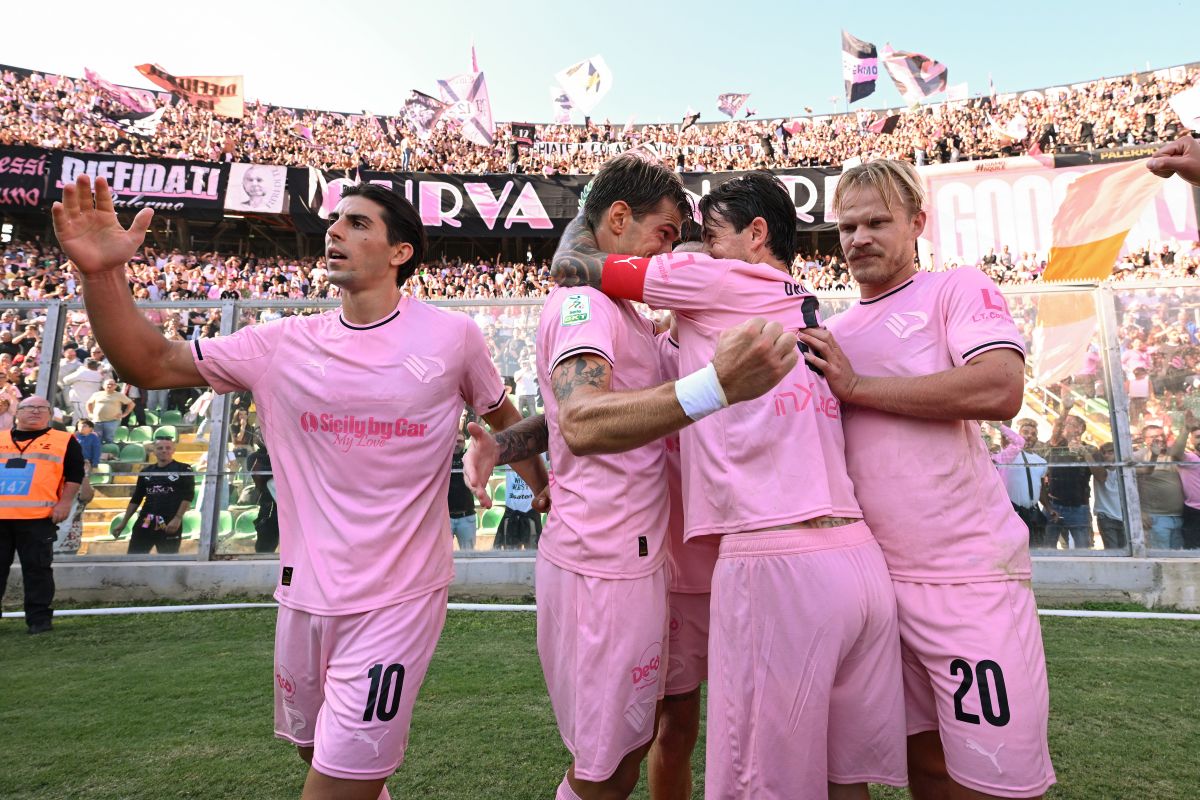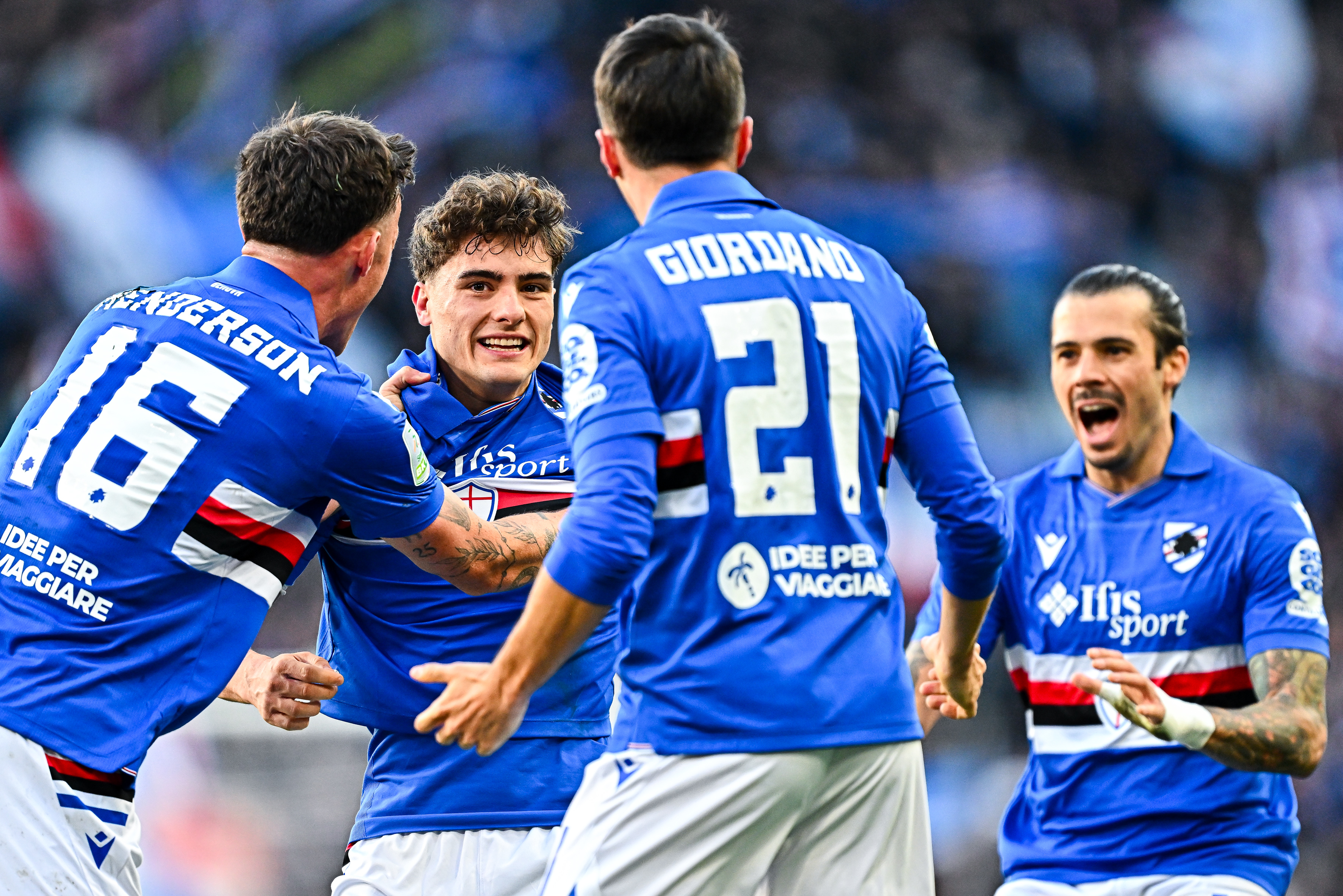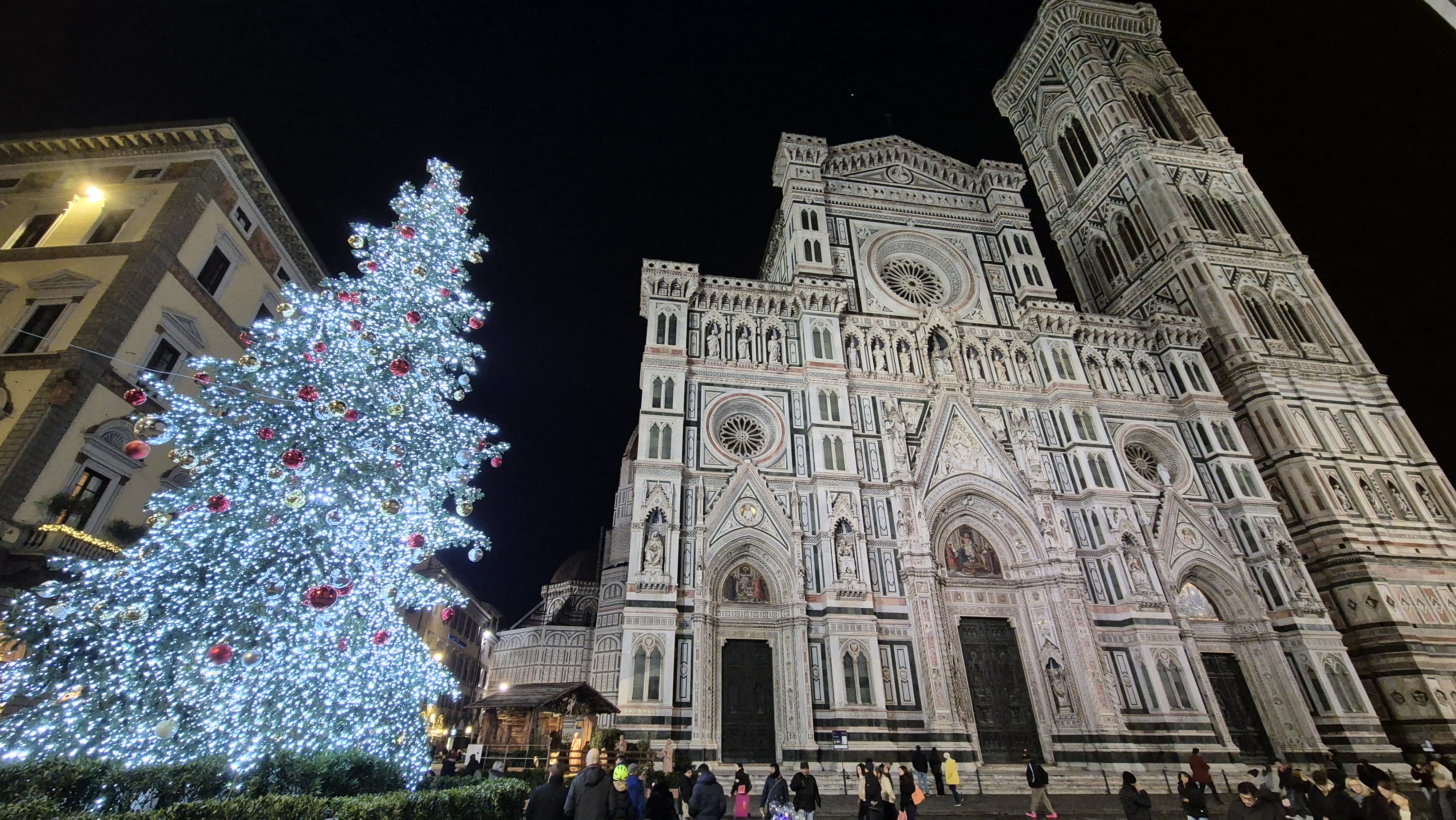
More Cage Than Curva… An Away Day With the Padova Ultras
By Editor DC
The domestic fixture list is on hold for the first international games of the 2025-26 campaign and the break has offered us the chance to give you a taste of life on the road as an away fan in Italy.
In this article for Destination Calcio, Calcio England joined the Padova ultras heading to Empoli on the opening weekend of the Serie B season.
Settore ospiti
Supporting your team on the road in Italy is not for the faint of heart.
Journeys stretch across this vast country, devouring time and money. And when you arrive, you might find rival ultras lying in wait – or, at the very least, squalid conditions and a forbidding welcome from the Carabinieri.
They call it the Settore Ospiti – the guest sector. But ‘guest’ is an ironic name for perhaps the most inhospitable place in a famously hospitable country. I had spent years gazing at those distant sectors from the home curva, wondering what it was really like. Now it was time to find out.
On the road
Padova, after years of near misses, finally clawed their way into Serie B last season. Their reward? A tough opening fixture away to Empoli, who had been relegated from the top flight. Expectations of a result were low, but the optimism of a new campaign carried more than 700 Padovani on the three-and-a-half-hour journey into Tuscany.
For the ultras, the trip carried extra weight. They have boycotted home games for the past year in protest at the crumbling state of Stadio Euganeo and while a chink of light exists for their return in the coming weeks, until then, away days are all they have.
The choreography of the experience began long before the Stadio Castellani floodlights appeared on the horizon. Electronic signs flashed on the autostrada: TIFOSI OSPITI – USCITA EMPOLI EST telling them where to go.

In a country where fan violence has frequently erupted at toll booths and service stations, the arrival of away supporters is tightly stage-managed.
At the end of the slip road, the Carabinieri waited to escort us through the suburban streets. Their presence was more ominous than reassuring, a reminder of the dangers that lurked beyond the autostrada – even if largely futile, since hardened ultras prefer to travel in scattered minibuses and cars rather than official convoys.
We were funnelled towards a holding area behind the stadium. As the buses wheezed to a halt, bloated bodies spilled out, dashing for the nearest wall. Picnic tables appeared from nowhere, laden with salumi and beer. The sun, the occasion, and Padova’s long-awaited return to Serie B had drawn not just the hardened tifosi in trasferta but families, students, and the curious.
Through the gates
Entry to the stadio unfolded in three acts. First, ticket and ID check – an anti-violence measure imposed years ago but enforced here with unusual zeal. A steward scrutinised my passport as if this were border control.
Second came the body search, conducted before the unblinking eyes of a row of Carabinieri and their canine colleagues. Finally, the electronic turnstiles delivered us into the away curva.
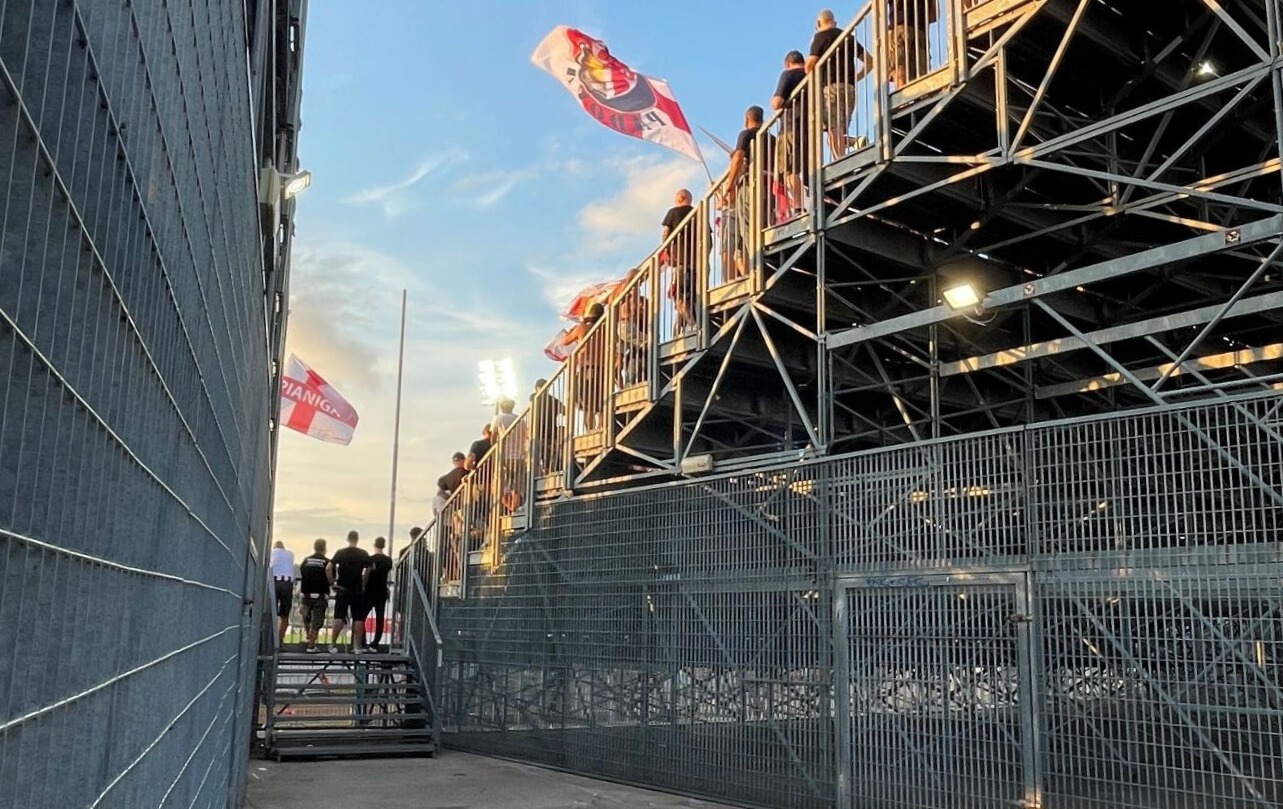
The scene inside unfolded in bleak detail. A skeletal scaffold terrace, streaked with rust, and a row of grim portacabins doubling as toilets. Intended as temporary structures, they become more permanent with each passing year. Every surface was plastered with ultras stickers, ghostly calling cards of a thousand visitors past.
The refreshment kiosk resembled a prison hatch, iron-grilled and joyless. The food looked edible but untouched. This was a place for liquid fuel: plastic cups of beer and shots of Caffè Borghetti, the bitter, caffeinated liqueur beloved of the tifosi.
Curva in motion
About 45 minutes before kick-off, the atmosphere changed. The ultras had arrived. They came armed with drums, megaphones, flags and banners. Stickers went up within seconds – Padova claiming their corner of Tuscany.
There is a uniform donned by the hardened away fan: black t-shirt, baseball cap, sunglasses, cargo shorts, trainers. No replica shirts. Beer in one hand, often a cigarette in the other.
As the Padova players emerged to warm up, the Settore Ospiti roared into life. The noise swelled again when the Empoli ultras appeared. Unusually placed along the side of the pitch, their rivals’ proximity sharpened the sense of confrontation.

The capo ultras – with backs to the pitch and megaphones in hand – set the tempo. The curva moved as one: flags swayed hypnotically in the air, drums thudded like artillery, and smoke bombs billowed, coughing out an acrid red fog that clung to the throat. The cocktail of sulphur and tobacco was both suffocating and intoxicating.
For a moment, it felt less like a football match and more like stepping into a ritual. Lost in the chaos – the colour, the noise, the sheer physical weight of it – I barely noticed that the referee had blown to start the game.
The rhythm of support
The capos fascinated me. Passionate, relentless, yet rarely watching the match. They perched precariously on the railings, physically held up by their lieutenants, orchestrating every song, every clap. Theirs is a strange kind of authority – neither elected nor explained, yet absolute.
An early Empoli goal only fuelled the Padovani chants. When Padova equalised minutes later, the reaction was raw and spontaneous, a primal eruption that briefly broke the capo’s choreography.
Half-time brought respite, though not for the kiosk staff, who frantically passed litres of beer through the iron bars. Many tifosi lingered too long, and when the second half began the capo dispatched envoys to herd them back into the curva until discipline was restored.


Two Empoli goals, either side of the interval, killed the contest. Yet the Padovani support was relentless. The martial cry of “Noi Vogliamo Questa Vittoria” softened into more melodic renditions of “Padova Alé”. Volume unbroken, tone transformed; less demand, more devotion.
The Final Whistle
When the final whistle sounded, the Padova players did not retreat. As one, they climbed over advertising boards, crossed the athletics track and stood beneath the curva in touching distance of the tifosi. It wasn’t a token gesture. It was an affirmation that this bond between players and supporters endures regardless of the scoreline.
Then came the inevitable lock-in. Away fans are penned inside until the locals disperse, a custom accepted with weary resignation. Some supporters used the time to drink more; others exhibited faux outrage at the exit gates, knowing full well the drill.
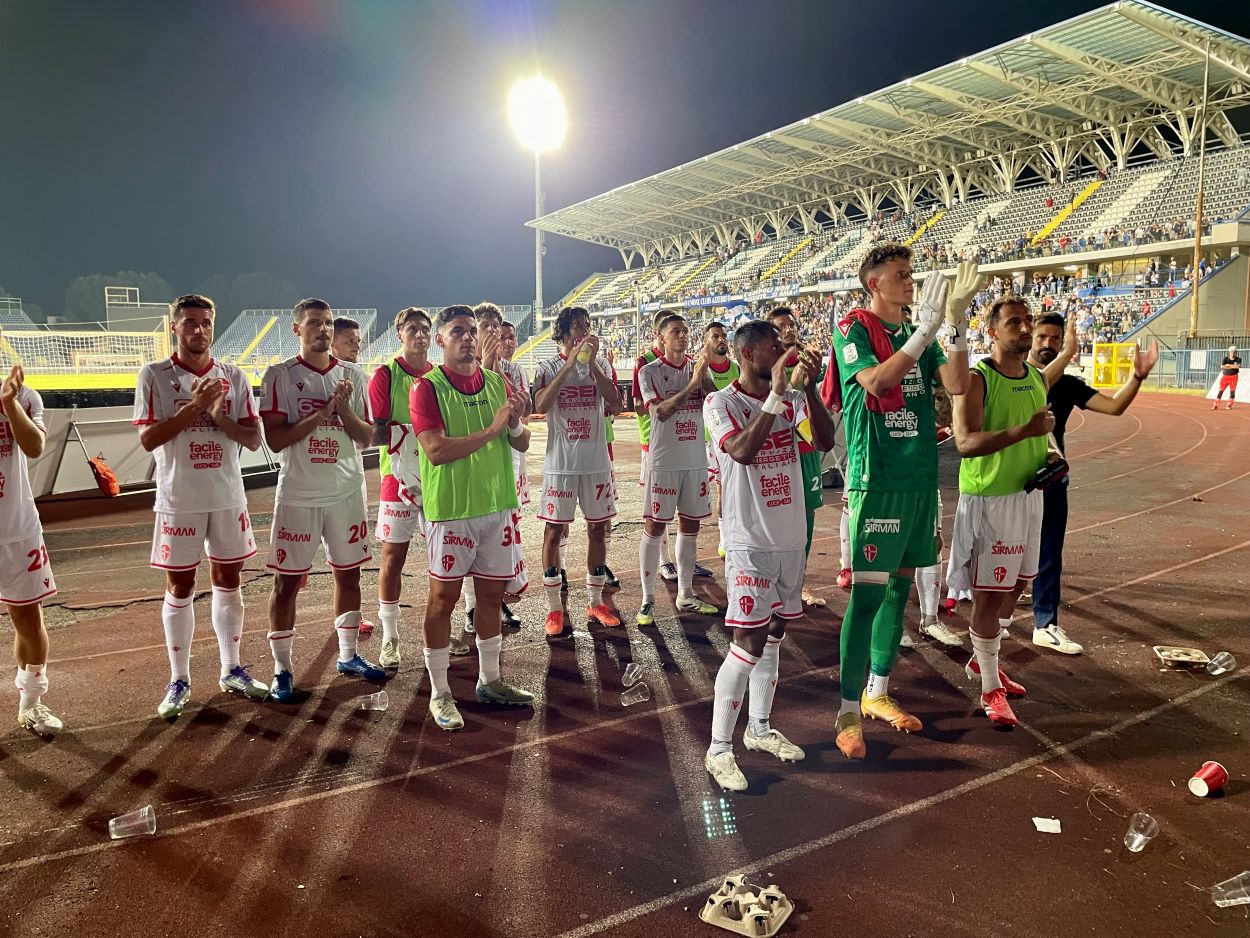
After half an hour, the gates creaked open. A rush of bodies spilled out, only to be held again at the perimeter fence by a padlock and chain. Finally, we were released into the night.
Away Days, Italian Style
So, this was the Settore Ospiti. More cage than curva, more ordeal than welcome. Italian away days are not comfortable, they are the antithesis of modern football.
They test your patience, your wallet, and sometimes your nerve. But when the smoke bombs ignite and the voices rise in unison, you understand why people do it. It isn’t just about watching football. It’s about belonging – about standing shoulder to shoulder with your people in hostile territory, knowing that for ninety minutes, this grim little corner of scaffold and concrete is home.
Related Articles
Related Articles
Sampdoria against Palermo at the Stadio Luigi Ferraris is just one of the standout matches to be shown live on Destination Calcio TV.
The Serie B season reaches halfway when the action returns after the winter break, with more live matches to look forward to on DCTV.
Florence is a dream destination year-round, but visiting during the winter months offers a completely different and magical experience.


